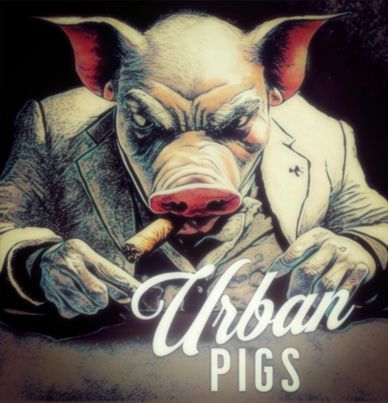The broker brought him at eight, sharp. He had very little idea what to expect – a sense of safety, of finality – but no concrete understanding of how this tiny house could provide those things. The risks were so great, but he had no alternative, given how badly things had ended at the previous place. He shuddered at the final memory of his wife.
And so, at eight o’clock, he and the broker stood on the doorstep, and knocked. It took all he had not to turn around, to cast a fearful eye over the dingy, empty street. At least he hoped it was empty. Years of experience fought against the broker’s strict instructions.
“Eyes front,” the broker said, as if he could read his mind. “No matter what might be out here, you need to do this right.”
The door opened, half way, revealing an even greater darkness within. He waited.
“Go on,” the broker hissed. “They won’t wait.”
He pushed the door wider and walked inside. He blinked, but his eyes could not adjust to this darkness. He heard a whispered exchange; one voice, the broker’s, and the other belonging to a man he couldn’t see.
“Come with me,” the new voice said after the door was shut.
“How…” he began, but then he noticed the faint glow dancing away from him. Some kind of incandescence on the clothing. He groped forward, his fingertips eventually finding a rough wall.
“Hurry.” A whisper from somewhere ahead, and below.
He crouched and reached forward. His hands found an open space at the base of the wall, just large enough to crawl into.
“Close it,” the voice said, once he had squirmed through the narrow entrance.
Close what? And how? But the space he had entered was larger than it had first seemed. Wide enough to turn, but no room above, to lift his head.
“Quickly.” The whisperer’s voice betrayed irritation, perhaps a hint of fear.
He found a heavy metal grille, pushed it shut, eliciting a satisfying click. His companion made no sound, but he could sense his relief.
He turned to see the faint glow shimmer away, turn to the right and then vanish. He reached forward and crawled.
And now the glow stopped moving, and he heard a knock. A complex series of taps and thuds. He tried to memorise the sequence, but got lost after the first six or seven.
And then, light. His eyes squeezed themselves shut, and a hand grabbed his collar and dragged him forwards.
He knew he was in a kitchen from the smell. Onions. Carrots. Peppers. Was that a hint of chilli? These were aromas from another world, another time. He closed his mouth and wiped his chin.
“Sorry,” he said, his eyes still tight shut, trying to remember if the broker had told him anything about drooling.
“Who is he?” a woman’s voice asked.
“The broker brought him.” He recognised this voice as belonging to his guide, although he was no longer whispering.
“Please,” he said. He opened his eyes and looked up. It was too bright to see much, but through the blur he could make out a small group of people – eight perhaps? They had formed a semi-circle around him. He looked at their faces one by one, as the broker had told him. Form a connection, he’d said.
They turned away from him, into a tight huddle. He strained to hear their whispers, but caught just a few words: “monster”, “necessary”, “truss”. Or was it “trust”?
They separated and turned back to face him.
“Close your eyes,” a new voice told him.
Something in their faces made him hesitate. And then a movement in the corner of his eye. A man was coming towards him, fast, with something big, heavy. And then nothing.
He woke to darkness.
He turned his head, and felt the resistance of tight bands around his chest, arms and legs. No light, but the slightest notion of a sound? A mouse holding its breath?
“Hello?” he said, his voice sounding far too loud for the dark, empty space.
He swallowed. Sweat dripped into his eyes, making them blink rapidly.
“Is—is someone there?” Again, the sound. The sound of nothing, but from another direction. His head spun towards it, the click of his neck almost deafening.
His breathing was a roar now and below it was the tiniest noise, but so close he could almost taste it. And a smell. Like perfume, natural and sweet. He sniffed and froze as he felt something tap the back of his neck.
His body racked, straining against its bindings as something finger-liked crawled around his neck, reaching to his throat. He screamed. But the fingers tightened so fast the scream was cut off before it could break loose. He jerked his head to the side, a desperate attempt to break the increasingly tight grip.
“Shhhh….” He felt the breeze of the whisper on his ear, and it calmed him. His final breath inward brought in no more than a trickle, and the grip continued to tighten. Now the fingers were sharper, cutting. Warmth on his neck, dripping down to his chest. In his last moments he thought of his wife. His overriding feeling was relief—gratitude almost. All those years, hiding. He wouldn’t need to hide any more.
* * *
The broker brought him at eight, sharp. This was wrong. Out of order. But the newcomer was inside now. The household would have to decide.
“Seeds,” he hissed to the broker. “You were supposed to bring seeds, not him,” he said, gesturing back within the house.
“He’s a good guy,” the broker told him. “A botanist. You’re the gardener, right? You could use a botanist.”
If true, this might indeed be useful.
“Maybe,” the gardener said, “but we’re already full. You know that. We barely have enough to survive as it is. One more…”
“Yes,” the broker said, touching the gardener’s elbow in a manner that was far too familiar, “one too many for now, maybe, but if he can increase your yield…”
Fine. The others could decide.
“You vouch for him?”
“Of course.”
“And seeds next time?”
“If you pay me, yes. I don’t do this for nothing, you know? I take a great risk for you.”
The gardener looked down at the crate he was holding. The thought of handing over so much for so little… He pulled the tomatoes out of the crate and handed the remainder to the broker.
“You’ll get tomatoes next time,” he said. “When you bring seeds.”
The broker looked at him for a moment and then shrugged and disappeared into the night.
He looked at the newcomer’s face, illuminated by a thin dash of moonlight.
Damn broker.
This guy was no botanist. A huge ape of a man with eyebrows like tyre tracks. He closed the door and breathed.
He’d been following this arrangement with the broker for more than a year now, and had never had any trouble, but that didn’t mean things couldn’t go wrong.
“Come with me,” he whispered.
The newcomer did pretty well, keeping up on the crawl to the kitchen. But once there he stayed on his knees, eyes tight shut against the bright lights.
A decision would need to be made. As usual, the girl was silent, but they all knew what her view would be. She was too trusting, had too little understanding of the real dangers of the world today. And so a compromise was proposed: the newcomer could stay, but for the first week he had to be tied up, and alone.
The gardener was unsure that this was necessary, but after some whispered debate, he saw the sense in it. The old woman, in particular, pointed to the newcomer’s ugly face. A monster if ever she’d seen one.
The geek picked up his club.
Once the newcomer was tidied away, the gardener went through the crawlspace into the house next door. Their lodgings were made up of a terrace of houses, each accessible through concealed doors that led from one to the next. The living space was at one end, as far away from the only connection to the outside world as possible. The other houses in the row were mostly given over to growing food, and all were heavily fortified, booby-trapped, to keep danger out.
The girl was there, as she often was, tending to the cucumbers. He watched her for a moment. She was, apart from his plants, the only thing he really cared about. She’d been here when he arrived, and he’d never heard her speak, knew almost nothing about her. But that was the way it was in this house. No stories. No names. Easier that way.
“All ok?” he asked her. She didn’t answer, but he could feel her contentment.
“I need to head over to the tomatoes. The kid says a lightbulb blew there this morning,” he said.
This was where he felt most at ease, amongst the soil, roots and leaves. Everything here happened in a predictable way. He planted seeds, he watered them and gave them light, and they grew. Then he and the others ate them and the cycle began again. Which reminded him, the broker had not brought seeds, which meant they would start to run low soon. He could ill afford a slip of that kind.
He pulled out the dead lightbulb and screwed in its replacement. As it flickered to life, he wondered, as he had often wondered, how the house still had electricity. The others had spoken vaguely of a generator, but he’d never found it, and had no idea where its fuel came from. He tried not to think too hard about this.
Later, over dinner, they discussed the newcomer again.
“Broker says he’s a botanist,” he told the group.
The old woman snorted. She never did trust anyone, and particularly not the broker.
“Could he help you, with the food?” the geek asked.
He shrugged.
“Maybe. Not quickly.”
“But did you see his face? Like an animal. So much hair,” the old woman said.
The red-headed kid nodded. “I don’t see why we’re trusting him. There’s not enough food as it is. We don’t need anyone else, even if he is a botanist.”
“What would you have done?” the gardener asked the kid. “Left him out there, to die?”
The kid shrugged.
“The broker does ok.”
That was true enough.
“Someone should feed him,” the journalist said, straightening his tie. That meant “not me,” the gardener knew.
“FIne. I’ll do it,” the red-headed kid said, reluctant but cocky.
“Not too much,” the gardener told him. “Not until we know for sure.” No need to waste precious food.
The kid had just been gone a minute when they heard his hoarse scream.
“Oh God! Oh God! Oh God! They got him! He’s… he’s…”
The kid was back in the kitchen, eyes wide and staring, mouth moving.
Everyone was up at once, running.
The gardener turned on the light in the room. At first he thought it was empty. But he smelled the newcomer before he saw him, or what was left of him, cut to shreds and scattered around the room.
They shut the door. Everyone avoided eye contact.
“What did you do?” the old woman asked the red-headed kid, her voice hysterical.
“Me?” he shouted, blinking. “Why me?”
“Well it had to be someone, and you were the only one who wasn’t there, at dinner,” the geek said.
The journalist nodded. “We lock up the kid,” he said.
So they clubbed the red-headed kid, found another empty room and tied him to a chair.
* * *
The broker brought him at eight, sharp. She smiled to herself. He wasn’t due to bring another human this time, and usually that would make her angry: her system was effective, but fragile. But she’d been getting hungry lately, so the timing was good.
She reached out to the mind of the gardener. “Bring him,” she told him, and he did.
And once he was inside, “tie him up,” she told them, without words. They couldn’t hear her, but they usually listened, particularly when, like now, her words chimed with their own thoughts.
Such a finely-tuned instrument, this house. Machines within machines. The gardener with his heat lamps and his rooms full of soil and food. Not for her, but for them. They never noticed what she did, so they didn’t notice what she didn’t do. Like joining them for meals.
And the broker. Not strictly part of her system, but an essential component, nevertheless. He knew what time to arrive, how to prepare them, and even, it seemed, when it was time to break the rules. Sometimes she wondered if he understood the importance of his role, what he was a part of.
It was he, the broker, who had brought her here, years ago. After she and her fellows had woken up from their centuries-long sleep, and the humans had started their resistance against them, she had needed a base, somewhere to operate, to survive.
The humans had tried so hard to understand, to define her and her kind. So many stories: vampires, werewolves, demons. But she was none of those things.
So she lived among them, as one of them. She was so small, so unthreatening, that no-one ever guessed who or what she was. Until it was too late.
Each feeding could sustain her for many months. But eventually she would begin to feel the hunger. And now she knew she had to eat. And once she was finished, the broker would bring her what she needed to refuel the generator and then the cycle could begin again.
They tied the newcomer to a chair for her. Her first meal in such a long time. She wanted to enjoy it, to luxuriate in it. She waited, with him, until he woke. Then she allowed herself to make enough noise that he would know she was there. She creeped around him, enjoying his fear, tasting it, almost. But eventually she could wait no longer. She stretched her long fingers around his soft, fragile neck and squeezed. She felt his panic but told him to be calm. He would taste better, less bitter, if he was calm. And once she had satisfied herself, she left him and wandered the house again.
When they found the body, they blamed the red-headed kid. No-one had wondered where she was.
And by the time they worked it out, it was too late. There were too few of them left. She picked them off one by one. The old woman was the last.
“What are you?” the woman asked her.
She could not speak, but she opened her mouth and showed her teeth. She could tell from the woman’s reaction that she understood. Not what she was, but what she did, what she was for.
And after, she waited, and marvelled at the beauty of her creation.

Ben Coppin lives in Ely in the UK with his wife and two teenage children. He works for one of the big tech companies. He’s had a textbook on artificial intelligence published, as well as a number of short stories, mostly science fiction, but also horror, fairy tales among others. All his published stories can be found listed here: http://coppin.family/ben.
Find him on twitter at @bubbagrub



Leave a comment